Ebenezer Phillips
The fighting farmer of nash
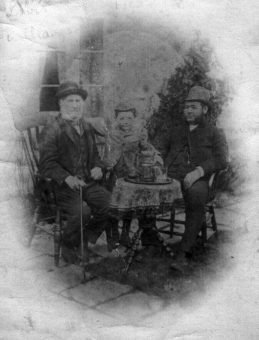
Ebenezer Phillips was the father of our great-grandmother Catherine Phillips, making him our 2nd great-grandfather. Ebenezer was born in 1846 the 4th child of William Phillips and Rebecca Ashfield of Nash, near Newport. His parents had married on 1st October 1834 and lived together at William’s childhood home, which we believe to be Old House in Nash, where they raised their family.
The couple had seven children, all baptised at St Mary’s in Nash: Mary 1840, Hannah 1841, Edwin 1844, Ebenezar 1846, Eliza 1849, Rebecca 1852, and finally Emily born in 1854. William Phillips had two trades, Farmer and Cordwainer (shoemaker), and it was the former trade that Ebenezer was destined to follow. From a young age he worked hard on the farm and learnt the skills required to succeed in farming.
Ebenezer was to live somewhat of a colourful life, evidenced by numerous newspaper reports of court appearances. He could be described as fighting man who enjoyed a drink, behaviour which appears to be quite common in Nash at that time. In 1867 he had his first brush with the law whilst drinking with eldest brother Edwin in Maindee. They became involved in a violent dispute with a fellow farmer named Edward Morgan, who had accused them of stealing his cattle.
The brothers were charged with assault and battery on the public highway and found themselves in court. Ebenezer was acquitted by the court due to a lack of evidence, but Edwin was convicted and fined. Ebenezer wasn’t always the aggressor, in 1868 he was assaulted at the Waterloo Inn in Nash by Mark Ball and John Jones who were fined and bound over to keep the peace.
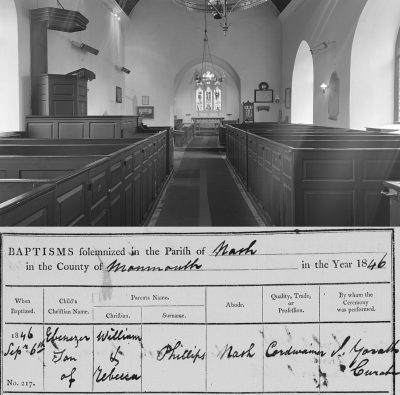
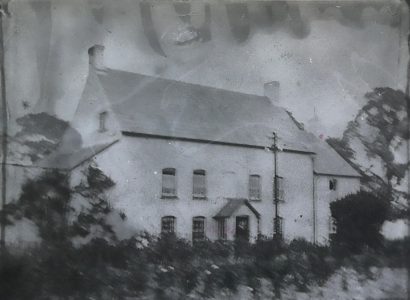
In 1868, a year after his court appearance, Ebenezer married 14 year old Catherine Alice Morgan Williams. Catherine had been born at Spitty Farm in 1854, the daughter of Lewis Williams a farmer and Catherine Morgan. The newlyweds lived for a short while with Lewis at Spitty Farm, before setting up home at Bryngwyn Farm, which was only a mile away. The farm was situated in a rural part of Newport and was surrounded by other farms including Upper Lakes Farm, Pill Farm and Spitty Farm. Today the land where the farmhouse once stood is occupied by Nash College in the built-up area of Lliswerry.
Ebenezer had a good relationship with Lewis Williams, his father-in-law. Lewis would breed horses which his son-in-law would then sell. In 1875 the pair were sued after a horse did not live up to the billing Ebenezer had given it, but they were able to defend the action in court. Ebenezer had further success in court in August of that year when he successfully sued the Monmouthshire Rail and Canal Company for ruining some of his hay.
1875 was a busy year for Ebenezer and he found himself back in court charged with assaulting Charles Blake. He had been jointly charged, along with a friend and his wife, after Mr Blake was assaulted by the three following a night out. A witness had seen Ebenezer ambush and strike the complainant and he was duly convicted. He was fined 40 shillings plus costs, or one month in prison, Ebenezer paid the fine.
Bryngwyn Farm was jointly owned by Ebenezer and his father-in-law Lewis. The property provided Ebenezer with all the tools he needed to make a good living, it included a valuable orchard and prime pastureland as well as a modest farmhouse for the family. Ebenezer also won several lucrative contacts with the town council to complete various fencing projects around Nash and the Marshes and he started to accumulate significant wealth.
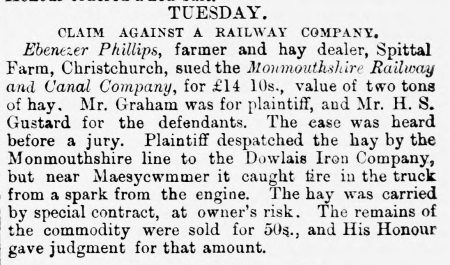
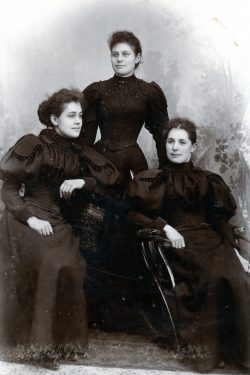
The 1881 census shows the Phillips family living at Bryngwyn Farm, they had four children: Catherine (our great-grandmother) 1871, Susannah 1873, Beatrice 1877, and Ebenezer Jr. 1879. Catherine’s father Lewis, aged 76, had now retired and was also living at the farm. By the 1891 census a final son Charles (known as Fred) had been born in 1882. The entry for Ebenezer shows him farming 200 acres.
In 1880 the Elementary Education Act made elementary education compulsory. Ebenezer soon fell foul of the new law and in 1882 was fined by the School Board. He had failed to ensure his children went to school, with one attending on only 6 occasions out of a possible 116. The fine had the desired effect, and the children all went on to receive a solid education.
A further court appearance for being drunk and disorderly occurred after an incident at the King of Prussia pub in Somerton. One of Ebenezer’s employees had to summon the police after he had been unable to stop his drunk master fighting with the pub landlord in a row about sheep. The police found Ebenezer staggering around the pub kitchen after knocking down the landlord three times. Ebenezer was then removed from the pub by the police. In court he claimed to have been simply over excited but was fined 10 shillings.
Despite of all the issues Ebenezer faced, he did mange to establish himself as a significant figure in Nash. He served almost a decade as a local councillor, often standing unopposed, he was also a lead mourner at the funeral of several notable local people. We also found references to Ebenezer contributing to collections for the poor and being involved in events to celebrate local customs.
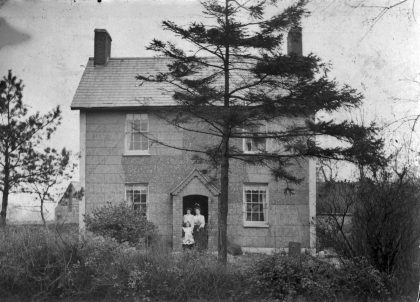
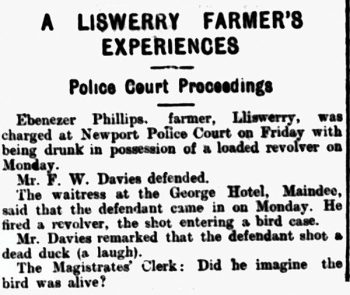
Ebenezer lost his wife Catherine in September 1896; she was only 42 years old. Four years later at the age of 54 Ebenezer remarried, his bride was 30-year-old Kate from Kent who had been living in lodgings on Chepstow Road in Newport. Kate went to live with her new husband and stepson Fred at Bryngwyn Farm. It was whilst out celebrating his marriage that Ebenezer was to find himself embroiled in his most notable incident.
Ebenezer and Kate took a trip to Newport to visit Kate’s former lodgings on Chepstow Road to collect some of her possessions, they then visited a pub in the area. Drinks were consumed and they ended up at the George Hotel in Maindee. Ebenezer was refused a whiskey as he was too drunk. He responded by pulling out a loaded revolver from his pocket and shooting at a glass display case containing a number of stuffed birds.
He was arrested later that night at the Cross Hands pub on Chepstow Road and charged with being drunk in possession of a loaded revolver. In court the defence claimed that their client wasn’t drunk and had only consumed three drinks. Ebenezer told the court that he had no idea the gun was loaded and was just fiddling with it when it went off.
Kate told the court that the revolver belonged to her and was amongst her possessions when they visited her former lodgings and Ebenezer had put it in his pocket. Kate claimed that a young nephew had loaded the weapon and Ebenezer had no idea it contained bullets. He was fined 10 shillings for his drunkenness in the Cross Hands but was acquitted of the charges relating to the revolver. You can read more about the case here.
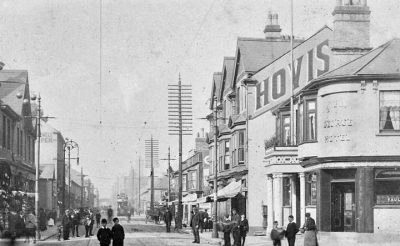

The 1901 census showed Ebenezer, Kate and 19-year-old Fred living at Bryngwyn Farm. Ebenezer died the following year on 26th January 1902, he was aged just 56. He had struggled with alcohol abuse for many years and his death was caused by a combination of Delirium Tremens (DTs), brought on by withdrawal from alcohol, and Bronchitis.
He left an estate worth £4359 (approx. £450,000 today) to John Ford Haine, farmer at Upper Lakes, and Lewis Augustus Williams, his brother-in-law, of Spitty Farm. The legacy was later used to allow his son Fred to take over Bryngwyn Farm, where he farmed and lived for the rest of his life.
If you have any further information about Ebenezer please get in touch: research@skinnerfamilyhistory.com
